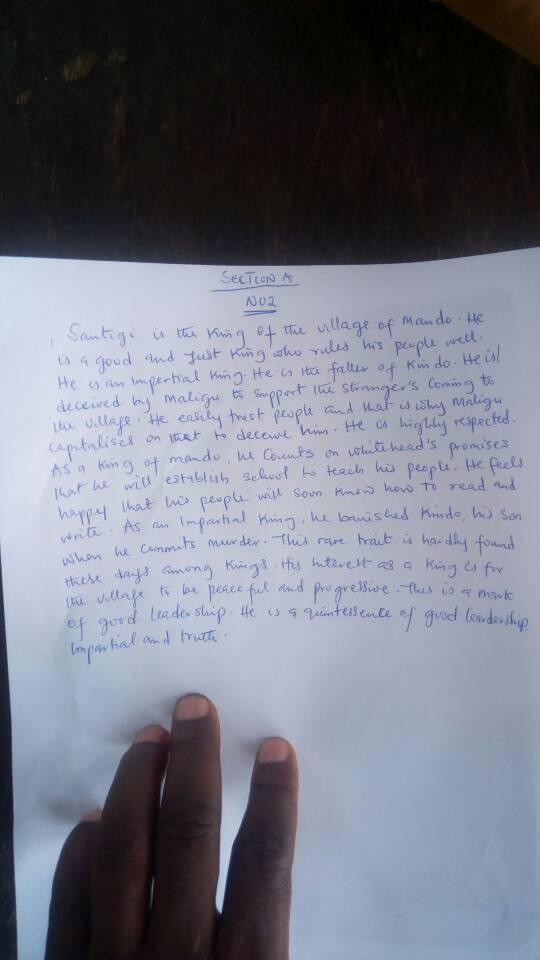10)
The mood is gloomy and sober with a
corresponding tone of lamentation and
pessimism. There appears to be a shift in
tone in the last stanza as he expresses
hope but he ends the stanza on a
pessimistic note.
As a result of the many years of failed
governance, the country experiences all
kinds of social problems like violence,
robbery, insurgence, kidnapping thus
becoming a sabre-toothed tiger/a giant
hawk . The youths and elder statesmen
refrain from agitation for fear of being
persecuted or repressed by government:
While infants shudder home/the grizzled
ones snatch their gut/from bayonets of
tribulation/halting venturous walk at dusk .
In the last stanza, while the poet looks
forward to a generation that will take the
nation out of its hopeless state toward the
shore of possibilities, his hope is
threatened by the ravenous nature of the
ruling class: The land lies patiently ahead/
awaiting in ambush , ready to devour the
future change- agents.
No9==
No12
The poem titled "The Schoolboy" holds its popularity and high level of likeness to how the poet decently challenged the trending classroom education; surely William Blake is a genius.
"Early to bed is early to rise" but such idiomatic expression has nothing to do with the schoolboy during the summer morn: "I love to rise in a summer morn/ When the birds sing on every tree" (line 1-2). Such period is most delightful to the boy since the simple, sweet and spontaneous education he derives is far higher than that of the classroom learning.
Looking at the six stanzas of the poem, it is obvious that the poet paid attention to the rhythm and the rhymes without allowing poetic license steal the simplicity of the poem. What more can be said of the language? There is no obsolete word, no Shakespearean English, no huge vocabulary that will prompt opening the dictionary. Unhappiness of the schoolboy coupled with rhetorical questions in the poem gave it a sad tone;
"But to go to school in a summer morn,_
O it drives all joy away!
Under a cruel eye outworn,
The little ones spend the day
In sighing and dismay" (quoting stanza two of the poem)
Other poetic languages of not are rhetorical questions, symbolism, repetition, alliteration, etc.
Tony Lumpkin
son of Mrs Hardcastle by her first husband (Mr Lumpkin) and stepson to Mr Hardcastle. He is a mischievous, uneducated playboy and a very consumptive figure; a fat, ale-drinking young man who has little ambition except to play practical jokes and to visit the local tavern whenever be has a mind; frightens the maids and worries the kittens. Proves to be good-natured and kind despite his superficial disdain for everyone. do Mrs Hardcastle has no authority over Tony, and their relationship contrasts with that between Hardcastle and Kate.
Tony takes an interest in horses, "Bet Bouncer and especially the alehouse, where he joyfully sings with members of the lower-classes. When Tony comes of age, he will receive 1,500 pounds a year. His mother hopes to marry him to her niece, constance Neville, who is in line to inherit a casket of jewels from her uncle. Tony and Miss Neville despise each other It is Tony's initial ception of Marlow, for a joke, which sets up the plot Tony goes to great effort to help Neville and Hastings in their plans to leave the country because he despises her.
Tony's free-wheeling ways ofdrinking and tomfoolery is probably because of the huge inheritance that awaits him when he comes of age.
10)
The mood is gloomy and sober with a corresponding tone of lamentation and pessimism. There appears to be a shift in tone in the last stanza as he expresses hope but he ends the stanza on a pessimistic note.
As a result of the many years of failed governance, the country experiences all kinds of social problems like violence, robbery, insurgence, kidnapping thus becoming a sabre-toothed tiger/a giant hawk . The youths and elder statesmen refrain from agitation for fear of being persecuted or repressed by government: While infants shudder home/the grizzled ones snatch their gut/from bayonets of tribulation/halting venturous walk at dusk .
In the last stanza, while the poet looks forward to a generation that will take the nation out of its hopeless state toward the shore of possibilities, his hope is threatened by the ravenous nature of the ruling class: The land lies patiently ahead/ awaiting in ambush , ready to devour the future change- agents.
: (2)
Santigi is the king of the village of Mando. He is a good and just king who rules his people well. He is an impartial king. He is the father of kindo. He is/was deceived by maligu to support the strangers coming to the village. He easily trust people and that is why maligu capitalizes on that to deceive him. He is highly respected. As a king of Mando, hr counts on whitehead's promises that he will establish school to teach his people. He feels happy that his people will soon Know how to read and write. As an impartial king, he banished kindo, his son when he commits murder. This rare trait is hardly found these days among kings. His interest as a king is for the village to be peaceful and progressive. This is a mark of good leadership. He is a quintessence of good leadership, impartial and truth.
NO4:













